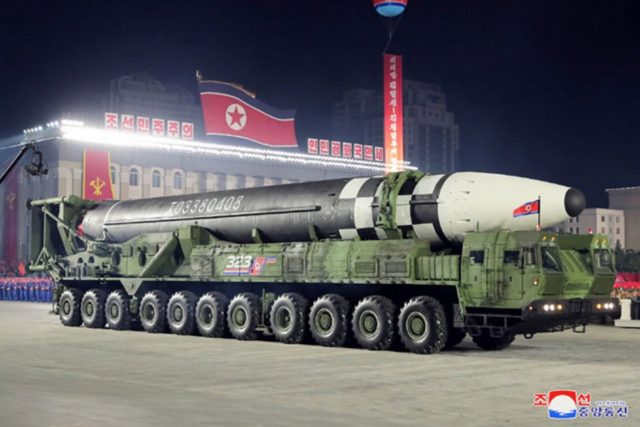Feb. 26 (UPI) — North Korea could have at least eight intercontinental ballistic missiles in its arsenal, but the status of some of its weapons is unclear, according to a British think tank.
The International Institute for Strategic Studies said in its annual report, The Military Balance 2021, that the Kim Jong Un regime could have eight ICBMs capable of targeting the continental United States, Radio Free Asia’s Korean service reported.
The estimate from the think tank comes months after North Korea unveiled a new long-range missile, the Hwasong-16, during a predawn parade in October to mark the 75th anniversary of the founding of the Korean Workers’ Party.
According to the IISS report the status of the Hwasong-16, designed to carry multiple warheads, is unclear. The think tank also said North Korea retains more than 3,500 main battle tanks, more than 500 multiple rocket launchers, 71 submarines and 545 combat aircraft.
North Korea maintains high troop levels. About 1.1 million soldiers are in the Korean People’s Army, 60,000 are in the navy, 110,000 are in the air force and 10,000 troops work in strategic forces that operate ballistic missiles, the IISS said.
The think tank also gave mixed reviews for diplomacy that began with North Korea in 2018. Engagement with Pyongyang reduced overall tensions, but it is uncertain the policy limited North Korea’s nuclear ambitions, the IISS said.
Kim Jong Un has claimed his country is ready to take on enemies and that he is developing tactical nukes and a nuclear-powered submarine.
According to IISS, no certainties exist regarding North Korea’s effectiveness or readiness against technologically superior opponents. North Korea’s military training also does not reflect its operational capabilities, the think tank said.
North Korea’s illicit weapons program has led to international sanctions against the country, but calls continue to grow in Seoul in favor of sanctions relief.
South Korean Unification Minister Lee In-young suggested in an interview with the Financial Times sanctions could be eased to address the humanitarian crisis in the North. Lee also said strict border closures could be aggravating the situation, the report said.

COMMENTS
Please let us know if you're having issues with commenting.